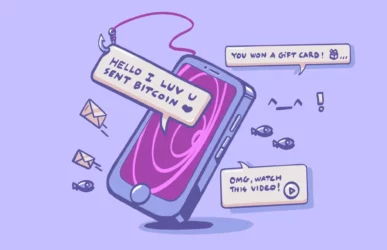Scams have been around since the dawn of civilization. Cavemen likely tried to scam one another over rocks. And throughout the centuries, humans have never stopped trying to get one over on each other. With the advent of technology, scammers have adapted, and now it is on our mobile devices in the form of fake text messages.
What is a fake text message?
A fake text message — usually called smishing — is from a scammer who is intent on stealing something from you. This is usually money, but it can also be something like your personal details so that a scammer can steal your identity. The scammer may also impersonate an authority figure, such as law enforcement, to entice you to hand over valuable items for “safekeeping.”
These types of messages are becoming a serious problem. Just in the United States alone in 2022, phone users received a staggering 225 billion spam texts, a 157% increase over the previous year.
Take precautions against malicious phishing links
How to identify a fake text message
So, how do you identify and confirm that a text message is fake? There are a few telltale signs.
The phone number is wrong
If the person claims to be related to you and the number is from another country, then the person is clearly not who they say they are. Always check the phone number first!

The phone number is from Eastern Europe or Asia
It’s obviously not fair to innocent, law-abiding people who live in these areas, but many of the scams originate from Eastern Europe or Asia (particularly Russia). Law enforcement in these countries can be lax and/or corrupt, leading scammers to feel that they are at less risk of being caught.
They’re urging you to click on a link
If the person contacting you claims to be from your bank and they are asking you to click on a link, do not do it. Real financial institutions won’t ask you to click on links. If in doubt, contact the person they claim to be via another means, and ask them if the message is from them.
They try to make the situation sound urgent
For a smishing scam to work, the scammer needs you to take action. Naturally, they don’t want to give you time to think things through. They want you to act spontaneously, without thinking. So the smisher implies that time is running out and that a decision is required immediately. Many targets then act rashly and show bad judgment because they have been put under pressure.
How do text scams target individuals?
There are various ways that text scams target individuals. Some of these methods are shockingly easy to carry out:
- They randomly make up phone numbers. Like email scammers, text scammers generate thousands or tens of thousands of phone numbers and then send fake text messages to each one. They have no idea if all of these numbers are genuine or not. They are basically playing the odds. Out of 10,000 generated phone numbers, maybe 100 of them are real. This is why you should never respond to a text scam — you’re confirming that your number is real.
- They get your number from social media. People are always over-sharing personal information on Facebook, Instagram, and many other platforms. This includes phone numbers. If your profiles are publicly accessible, then they have your number. Your social media account can also be hacked.
- They get your number from data breaches. Data breaches at companies are so common now that nobody pays much attention when they are reported in the news. In the first six months of 2024 alone, there were over 10,500 confirmed data breaches in the US. But what if your account was hacked and your phone number taken? That is why you should always be wary about the information you provide in these accounts.
Examples of fake text message scams
Here are some examples of the kinds of fake text message scams that are making the rounds. This will not be an exhaustive list because scams evolve all the time, as criminals try to stay one step ahead of law enforcement.
Get rich quick schemes
This can be anything from the infamous Nigerian Prince scheme to “recruiters” offering highly paid jobs for little work. Obviously, there’s no such thing as getting rich quickly. The rule here is if it sounds too good to be true, then it usually is.
And don’t forget, there are no Nigerian Princes ready to give you 10% of their secret fortune.
Your child has a new phone number
One of the most common text scams at the moment is when someone pretending to be a family member contacts you to tell you that they are texting you from a new number. Once you reply, you’re then asked for money.
Usually, the scammer claims to be the child of the victim. So, if you don’t have a child, then you will see right through this one. If you do have a child with a phone number, contact them by another means and check if it really is them. The chances are, it won’t be.
Your bank wants you to verify your account details
This one is an oldie, but it’s still being used because so many people fall for it. This scam usually involves a scammer claiming to be a representative of an organization — such as your bank — telling you that there has been suspicious activity on your account (or variations on that theme). You will be told that they will shut your account down unless you click on a handy link to prove that the account activity is legitimate.
Of course, that link will lead to malware. They will also most likely have a fake bank page set up where you can enter your account details.
You’ve won a million dollars!
One of the oldest scams in existence is making you believe that you have just come into an extraordinary life-changing amount of money. But before you can receive it, they need your personal details, including your bank account and your social security number.
There’s a package waiting for you at customs
Another scam currently doing the rounds is a text claiming to be from a parcel delivery company or the post office. The text will tell you that you have a foreign package being held at customs, and you must pay the import fees to receive it.
Naturally, they are nice enough to provide a handy payment link. They will not only take your fee but your card details as well.
What to do after you spot a text message scam

One of the worst things you can do with a scam text message is reply to it — even if it’s to tell them to take a hike. By doing so, you’re confirming that your number is live and active.
A lot of scam texts these days are sent out via automated software, so there is no actual person on the other side of the fake text message. Replying, therefore, really does no good whatsoever. You will only be making the situation worse.
There are only 3 things you can do when you have determined that a text message is a scam.
Warn your bank or other company
If you have given the scammer money before realizing that the message was fake, you need to inform your bank immediately. If you have revealed any other details, you need to let the relevant company know right away so they can lock down your account.
Block the number from your phone
The next step is to block the number from your phone to stop further messages.
This has a limited effect, however. Scammers like these operate hundreds of phone numbers, if not more. It’s like Whac-A-Mole. For every 3 you block, another 5 will pop up.
Report the scam text message
The natural last step is to report the message to someone. The police would be the obvious first choice, and they will likely file the incident and provide you with a police report if you have to deal with any monetary losses later. But the likelihood of them actually catching the person is virtually zero for the reasons already mentioned.
If the scammer claims to be from a specific company, you should let that company know so they can carry out their own investigations.
Let your phone carrier know. They have security departments set up for this very purpose.
Finally, let family and friends know about it so they aren’t fooled if they are contacted.
What to do if you click on a suspicious text scam link?
If you click on a link in a suspicious text, it will likely lead to malware or a fake webpage where you will be prompted to enter details. Even if you stop short of entering your details, you’ve still validated your number to the scammer.
Your biggest problem, however, is malware. Here’s what to do:
- If you’ve been taken to a webpage, shut down the internet browser immediately.
- Disconnect your phone from the internet — both Wi-Fi and data.
- Change the necessary passwords.
- Enable 2-factor authentication on the affected account (if you haven’t done so already).
- Scan your phone for malware with a reputable service. If you have an iPhone, it already has strong built-in protection. But installing a secondary app never hurts. This will involve temporarily reconnecting to the internet to download the anti-malware app, but that shouldn’t take long. Then disconnect again.
- If you have shared your bank details, seriously consider freezing your credit score. This stops scammers from setting up new credit accounts in your name and ruining your credit forever.
Understanding fake text message scams
You should never respond to fake text message. This will confirm to the scammer that your number is valid, and they will continue to harass you with more unwanted messages.
Fake text messages are usually full of grammar mistakes and convey a sense of urgency to get you to act without thinking. The phone number is also usually a dead giveaway — if they claim to be your sibling, for example, and the number is in another country.
Opening a fake text message is usually not the problem. The problem is when you click on a link inside the message. This can then download malware to your device or sign you up for expensive services. Never click on a link in a fake text message.
Scammers usually obtain personal information through social networks, personal websites, public records, and even documents in trash bins. Even shredded documents can be pieced back together.
How to stop fake text messages
You can never completely avoid scam text messages. If scammers are randomly generating numbers and hoping for the best, your number will eventually get caught in the net.
However, there are a few ways to reduce the number of messages you get, including fake text messages on iPhone. Quite simply, don’t publicize your phone number.
Here are a few tips:
- Make sure you only give your phone number to people who can be trusted with it, such as family members and trusted friends.
- For everyone else, consider getting a throwaway pre-paid burner number and a cheap phone to run it on.
- Don’t list your number on application forms. If necessary, give them the burner number.
- Don’t enter your number into social media accounts. Many of these platforms ask for your number to search your contacts list for other users. Do not do this.
The thing with scammers is that they move with the times. We’ve gone from in-person scams to landline phone scams and mail scams. Now, with the ever-increasing popularity of mobile phones, scammers have made the obvious evolutionary leap into technology. But the rules of dealing with scammers – and avoiding them – remain the same, regardless of the platform. Don’t reveal anything. A scam only works if the victim responds. Don’t respond.
This is an independent publication, and it has not been authorized, sponsored, or otherwise approved by Apple Inc. iPhone is a trademark of Apple Inc.







